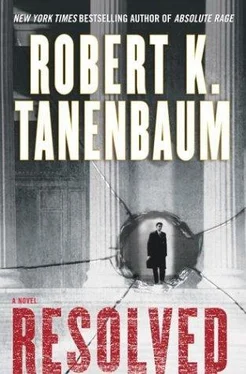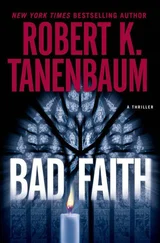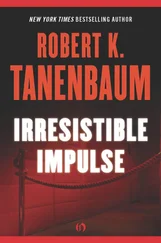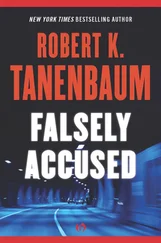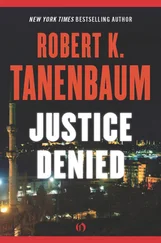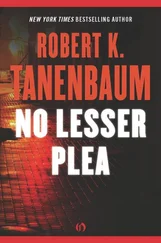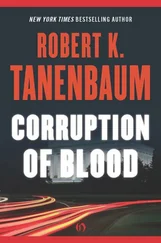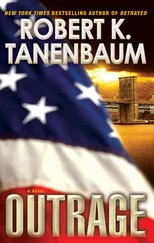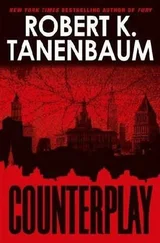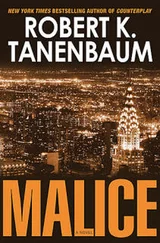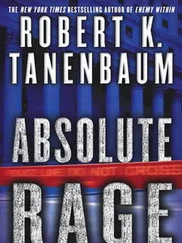Robert Tanenbaum - Resolved
Здесь есть возможность читать онлайн «Robert Tanenbaum - Resolved» весь текст электронной книги совершенно бесплатно (целиком полную версию без сокращений). В некоторых случаях можно слушать аудио, скачать через торрент в формате fb2 и присутствует краткое содержание. Жанр: Криминальный детектив, на английском языке. Описание произведения, (предисловие) а так же отзывы посетителей доступны на портале библиотеки ЛибКат.
- Название:Resolved
- Автор:
- Жанр:
- Год:неизвестен
- ISBN:нет данных
- Рейтинг книги:4 / 5. Голосов: 1
-
Избранное:Добавить в избранное
- Отзывы:
-
Ваша оценка:
- 80
- 1
- 2
- 3
- 4
- 5
Resolved: краткое содержание, описание и аннотация
Предлагаем к чтению аннотацию, описание, краткое содержание или предисловие (зависит от того, что написал сам автор книги «Resolved»). Если вы не нашли необходимую информацию о книге — напишите в комментариях, мы постараемся отыскать её.
Resolved — читать онлайн бесплатно полную книгу (весь текст) целиком
Ниже представлен текст книги, разбитый по страницам. Система сохранения места последней прочитанной страницы, позволяет с удобством читать онлайн бесплатно книгу «Resolved», без необходимости каждый раз заново искать на чём Вы остановились. Поставьте закладку, и сможете в любой момент перейти на страницу, на которой закончили чтение.
Интервал:
Закладка:
A map of Manhattan next appeared on the screen, marked with the location of the six Manhattan bombs: the courthouse parking lot; Baxter Street; the midtown bus; a subway car at Eighty-Sixth Street; a bakery truck on Greenwich Avenue in the Village; and a movie theater on Lexington and Thirty-Fifth. There did not seem to be a pattern in the targets, the timing of the explosions, or their location. The terror was as random as the weather, its author of no discernable political or religious persuasion.
They had done a psychological profile of him, too. A loner, they thought, not political, a grudge against society, a careful worker, probably college-educated, an American, may have been institutionalized at some point, either between jobs or a nightshift worker. They didn't think this series of bombing was the work of a foreign terrorist cell. Next, the FBI man talked about the Horowitz connection. Judge Horowitz's car had been blown up in the courthouse parking lot, killing an officer. Nine days later, the judge had been killed by a large bomb placed underneath a truck on Baxter Street and detonated by radio control as he drove by it in his brand new Lincoln. Theory: Horowitz was the target, and the other explosions were distractions. The judge's cases had been examined all the way back to his service in municipal court. Any convict he had ever sent to jail and was presently at large had been interviewed. His personal life had been minutely examined. The only halfway interesting suspect was Feisal ibn-Salemeh, presently incarcerated at Auburn, whom Horowitz had sentenced. But ibn-Salemeh seemed to have no contacts outside the prison. An exemplary prisoner, according to the prison, and a useful source of information about terror far from Manhattan. For a number of reasons, the American intelligence community did not wish to put the screws to Mr. ibn-Salemeh, and so the word came down from the highest levels that he was not to be unduly disturbed.
Another chart flashed on the screen. This displayed the names of the fifty-three people who had died in the six explosions, with lines showing how they were connected. There were a lot of lines, unfortunately; there always were. Raney stared at the reproduction of the slide provided with his handout. If six degrees of separation connected any two inhabitants of the planet, it was likely that fifty-six out of the city's nearly eight million would be connected in some way. It didn't necessarily mean much, although it had to be checked out. For example, two partners in a jewelry business had been killed in two separate blasts; a man killed in the bakery truck, Hassan Daoud, had once appeared as a witness before Judge Horowitz in a case involving that same ibn-Salemeh. Raney remembered that one- he had been the detective on the case. A minor drug dealer, Jongo S. Wallace, had also been killed in the bakery truck explosion, just walking by on the street. He had also once appeared as a prosecution witness before Horowitz.
The bus and the movie theater had yielded a total of sixteen victims with some connection to the criminal justice system. Raney scanned the names. A couple seemed familiar. Steve Lutz, for one, a lowlife and a part-time snitch. Raney recalled Lutz, a minor character in the drama of the late Felix Tighe, a reluctant prosecution witness. That got him thinking about Mary Chalfonte again. The case was cooling already. All they had was a few white cotton fibers and some could-be-anybody descriptions. Chalfonte seemed clean, no girlfriends they could find, no money troubles, the man seemed both devoted and destroyed by what had happened. So a wandering serial killer had caught up with Mary; she who'd escaped the clutches of one maniac had, through the mysterious workings of chance, been picked by another. Like the people killed in the bombings, bad luck was the only real connection.
The FBI man finished and was replaced by a colleague, who had diagrams of bombs to show. Apparently Manbomber was something of a genius in this line. The devices were all powered by RDX, a military explosive, mixed with plasticizing wax at nine to one, a combination known as Composition A3 that was normally used in artillery shells. Where did it come from was the question. The obvious place to get it was scavenging from military stores, but small quantities could be manufactured in a kitchen, if you knew what you were doing or were very lucky. This guy knew what he was doing. The FBI man guessed that the stuff had been homemade. Acetone peroxide had been used as a booster. This was a dangerous and unstable substance much favored by terrorists the world over. The bombs had been detonated by standard blasting caps, triggered by either timers, radio receivers, or trembler switches. They thought that the devices used had been carefully homemade from parts recovered from junk appliances, and hence untraceable.
The head of the FBI's terrorism task force, a rock-jawed, graying man named Earl Brannock, now took the podium to sum up. The Unsub was a white American, middle-aged, unemployed or a night-shift worker, probably unmarried. He may have spent time in mental institutions, but was probably quite intelligent, maybe college-educated. He had a high level of technical skill and may have trained in the armed services. The bombings were random and seemed to express nothing more than a general rage at the people and places of Manhattan. He may have had some contact with the criminal justice system. All these leads were being checked out. He wanted the detectives to keep alert, to report any suspicions no matter how far out. We're going to catch this guy.
After that, the chief of detectives made a brief statement: thank you, thank you, all work together, total commitment by NYPD, spirit of cooperation, know you have a lot to do, but details will be drawn from all detective squads in the city, notifications already on their way. We're going to catch this guy.
The meeting broke up. On his way out, waiting for the elevator, Raney fell in with Roy Arnolf, a detective he'd worked with in the old days at the Five in lower Manhattan. He remembered that Arnolf had been with the joint FBI-NYPD Antiterrorism Task Force for a couple of years.
"So, Roy, we gonna catch this guy?" he asked.
Arnolf snorted. "Yeah, if someone drops a dime on him or we get real lucky. He tries to rob a bodega with a bomb in his pocket."
"That's it?"
"Hey, how else? The explosives are untraceable. Like he said, you can make RDX from common chemicals or smuggle it in. What're we gonna do, inventory every shell and mine in every military in the world? He's making the detonators from scratch, just like the Unabomber used to do, and he never would've been nailed if he hadn't sent in that letter to the papers and if his brother hadn't recognized his particular brand of looney tunes. George Metesky, the Mad Bomber- he wrote letters, and he had a hard-on for Con Ed, so they caught him through employee records. The original Arabs on the World Trade Center were a bunch of amateurs. We traced them through the truck they used. So it's the usual thing, we get him with snitches or some bonehead mistake. Anyway, all this," he gestured broadly at the milling detectives, "is for popular consumption, so the bosses can say we've got two hundred of our best men on it."
"So basically you're saying an arrest is expected soon."
This raised a sour laugh from Arnolf. The elevator came and they got in and talked about other things for the ride down.
Felix liked the work. He especially liked having a place of his own and spending money and no fixed hours. It was practically the best deal he had ever had since he left his mother's house. The apartment Rashid had found for him was on Thirty-Sixth and Tenth, a fourth-floor walk-up in what started out as a Hell's Kitchen tenement, but was now a Clinton studio, mod. kit. strt. vw. He had plenty of new clothes, in a variety of styles- work clothes, business dress, tourist getups. He fancied himself now a master of disguise. He had a blond wig and a false beard, and a number of distinctive hats. Fooling the schmucks of the world had always been one of his prime delights, and now he was being paid to do it, and blow some of them up in the bargain. It was a boy's dream come true. Why Rashid was employing him in this way he never asked, nor did he care. He thought it had something to do with religion, that Arab shit, although Rashid did not seem to pray or perform any rituals, like the Muslims in the joint did. But who knew what the miserable little fuck got up to? Felix himself had no use for religion, which he conceived as mere lists of things you couldn't do. His mother had been religious in a way, a devout Satanist, but there they had lists of things that no one else was allowed to do, which you had to do, which sucked, too, as far as Felix was concerned. He had never found an object of worship more worthy than himself.
Читать дальшеИнтервал:
Закладка:
Похожие книги на «Resolved»
Представляем Вашему вниманию похожие книги на «Resolved» списком для выбора. Мы отобрали схожую по названию и смыслу литературу в надежде предоставить читателям больше вариантов отыскать новые, интересные, ещё непрочитанные произведения.
Обсуждение, отзывы о книге «Resolved» и просто собственные мнения читателей. Оставьте ваши комментарии, напишите, что Вы думаете о произведении, его смысле или главных героях. Укажите что конкретно понравилось, а что нет, и почему Вы так считаете.
